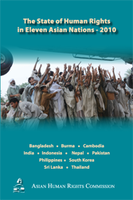 For the Human Rights Day in 2010 the Asian Human Rights Commission presents the reports on the state of human rights in eleven countries in Asia; Bangladesh, Burma, Cambodia, India, Indonesia, Nepal, Pakistan, the Philippines, Thailand, South Korea and Sri Lanka. The general picture that emerges is one of the failures of the states to carry out their obligations for the protection of people.
For the Human Rights Day in 2010 the Asian Human Rights Commission presents the reports on the state of human rights in eleven countries in Asia; Bangladesh, Burma, Cambodia, India, Indonesia, Nepal, Pakistan, the Philippines, Thailand, South Korea and Sri Lanka. The general picture that emerges is one of the failures of the states to carry out their obligations for the protection of people.
Serious defects are evident in the area of the judiciary. Judicial functions appear to be adversely affected by the absence of judicial independence as well as structural problems which deny the judiciary a place in terms of the doctrine of separation of powers. Judicial power itself is often restricted by constitutional and legislative limitations. Added to this is the problem of inadequate budgetary allocations for the administration of justice. This in turn affects the areas of the training of the judiciary as well as the availability of adequate numbers of judges to ensure the proper functioning of the justice system. Extraordinary delays often affect the possibility of fair trial. Lack of witness protection prevents many persons from obtaining justice. In achieving a higher degree of protection for human rights the problems relating to the judiciary require much greater attention in terms of the contextual problems that exist in the particular circumstances of many Asian countries.